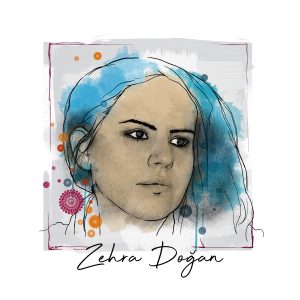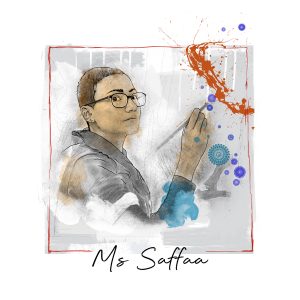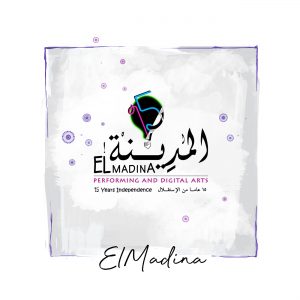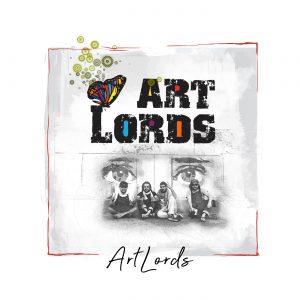8 Mar 2019 | Awards, News and features
[vc_row][vc_column][vc_video link=”https://youtu.be/HVXGKrAjRnE”][vc_column_text] Released from prison on 24 February 2019, Zehra Doğan is a Kurdish painter and journalist who, during her imprisonment, was denied access to materials for her work. She painted with dyes made from crushed fruit and herbs, even blood, and used newspapers and milk cartons as canvases.
Released from prison on 24 February 2019, Zehra Doğan is a Kurdish painter and journalist who, during her imprisonment, was denied access to materials for her work. She painted with dyes made from crushed fruit and herbs, even blood, and used newspapers and milk cartons as canvases.
Doğan used to work in Nusaybin, a Kurdish town caught in the crossfire between Turkey and Kurdish militants. She moved to the town to report on the conflict in 2016 and edited Jinha, a feminist women-only Kurdish news agency reporting in the Kurdish language.
When she realised her reports were being ignored by mainstream media, Dogan began painting the destruction in Nusaybin and sharing it on social media, and her art became important evidence of the violence in the town.
Doğan focused on striking, dark political scenes, but also on colourful scenes of traditional Kurdish life. In her most famous artwork, she adapted a Turkish army photograph of the destruction of Nusaybin, depicting armoured vehicles devouring civilians. In July 2016, she was arrested where witnesses testified in court that she was a member of an illegal organisation.
Although her trial ended with no sentencing, Doğan remained in prison until December 2016. In March 2017, Doğan was acquitted of “illegal organisation membership” but sentenced to almost three years for “propaganda” – essentially posting her painting on social media.
Her persecution is not isolated and takes place amid a crackdown on Turkish civil society. Using emergency powers and vague anti-terrorism laws, the authorities have suspended or dismissed more than 110,000 people from public sector positions and arrested more than 60,000 people between the attempted coup of July 2016 and the end of the same year.
Together with media and academic freedom, artistic freedom has come under attack. As a result, according to the Economist: “Artists have become more cautious, as have galleries and collectors.” Doğan’s situation was noticed by many artists in the world: Banksy painted a huge mural for her in New York and Ai Wei Wei sent a letter to her.
During her time in prison Doğan continued to produce journalism and art. She collected and wrote stories about female political prisoners, reported human rights abuses, and painted despite the prison administration’s refusal to supply her with art materials.
Doğan produced her own paint from food, drinks, and even her menstrual blood. She did not have brushes but used feathers of birds that fell into the prison yard. Security guards seized and destroyed the paintings she tried to send out of prison and punished her with a ban on communications with the outside world. She also gave drawing classes to other inmates and taught them how to make their own paintbrushes.[/vc_column_text][vc_separator][vc_row_inner][vc_column_inner width=”1/2″][vc_single_image image=”104691″ img_size=”full” onclick=”custom_link” link=”https://www.indexoncensorship.org/2019/01/awards-2019/”][/vc_column_inner][vc_column_inner width=”1/2″][vc_column_text]
Index on Censorship’s Freedom of Expression Awards exist to celebrate individuals or groups who have had a significant impact fighting censorship anywhere in the world.[/vc_column_text][/vc_column_inner][/vc_row_inner][vc_separator][/vc_column][/vc_row][vc_row][vc_column][vc_basic_grid post_type=”post” max_items=”4″ element_width=”6″ grid_id=”vc_gid:1551975581366-1308b39d-3e20-6″ taxonomies=”26925″][/vc_column][/vc_row]
7 Mar 2019 | Awards, News and features
[vc_row][vc_column][vc_video link=”https://youtu.be/i_eRNjepHBg”][vc_column_text] Ms Saffaa is a self-exiled Saudi street artist living in Australia who uses murals to highlight women’s rights and human rights violations in Saudi Arabia.
Ms Saffaa is a self-exiled Saudi street artist living in Australia who uses murals to highlight women’s rights and human rights violations in Saudi Arabia.
Collaborating with artists from around the world, she often focuses on Saudi women, their individuality and autonomy. She challenges Saudi authorities’ linear and limited narrative of women’s position in Saudi society, and offers a counter narrative. Recently, she has also focussed on human rights and the murder of Jamal Khashoggi.
Part of a new generation of Saudi activists who take to social media to spread ideas, Ms Saffaa’s work has acquired international reach. Through her use of social media and collaborations, Ms Saffaa amplifies her subjects’ voices online, beyond their life on a wall.
“I am my own guardian”, a series of murals she created in 2012-13, made waves in Saudi Arabia and internationally. This was a protest against restrictive guardianship laws that mandate women must have a male guardian’s permission to get married, undertake education, have elective surgery or even to open a bank account. She depicted Saudi women wearing the male Saudi headdress, with banners across their mouths saying: “I Am My Own Guardian”.
In 2016, a conservative Saudi man discovered her work and abused her on Twitter. This sent Ms Saffaa trending. Many activists retweeted her artwork, and used it in a movement protesting against Saudi Arabia’s guardianship laws, which used the artwork as the unofficial logo.
Ms Saffaa has faced online threats, harassment, and in 2017, after an interrogation by the head of intelligence at the Saudi embassy in Canberra, her passport renewal request was denied, leaving her stranded in Australia with a de facto travel ban.
With crown prince Mohammed Bin-Salman’s rise to power, expressing dissent or challenging the Saudi leadership has become even more dangerous. After the murder of prominent journalist Jamal Khashoggi, it is clear that dissidents face repression beyond a travel ban, and regardless of whether they live in the country or abroad.
In 2017, a mural celebrating Saudi women and the 150th day of the “I am my own guardian” movement was vandalised. In 2018, she recreated the defaced artwork with support from Peter Khalil, an Australian Labor MP. The new mural included the work of 10 local and international female artists as collaborators. On the week of International Women’s Day, she created a mural in Sydney to celebrate Saudi women’s resilience. It features two portraits of prominent Saudi activists imprisoned on terrorism charges. In November 2018, Ms Saffaa collaborated with renowned American artist and writer Molly Crabapple on a mural celebrating Jamal Khashoggi that read, “We Saudis deserve better.”[/vc_column_text][vc_separator][vc_row_inner][vc_column_inner width=”1/2″][vc_single_image image=”104691″ img_size=”full” onclick=”custom_link” link=”https://www.indexoncensorship.org/2019/01/awards-2019/”][/vc_column_inner][vc_column_inner width=”1/2″][vc_column_text]
Index on Censorship’s Freedom of Expression Awards exist to celebrate individuals or groups who have had a significant impact fighting censorship anywhere in the world.[/vc_column_text][/vc_column_inner][/vc_row_inner][vc_separator][/vc_column][/vc_row][vc_row][vc_column][vc_basic_grid post_type=”post” max_items=”4″ element_width=”6″ grid_id=”vc_gid:1551786362908-3b759dfe-64e8-9″ taxonomies=”26925″][/vc_column][/vc_row]
6 Mar 2019 | Awards, News and features
[vc_row][vc_column][vc_video link=”https://youtu.be/HmK19Kwc6lY”][vc_column_text] ElMadina for Performing and Digital Arts is a group of artists and arts managers who combine art and protest by encouraging Egyptians to get involved in performances in public spaces, defying the country’s restrictive laws.
ElMadina for Performing and Digital Arts is a group of artists and arts managers who combine art and protest by encouraging Egyptians to get involved in performances in public spaces, defying the country’s restrictive laws.
ElMadina’s work encourages participation — blending performances, story-telling, dance and training on human rights and citizenship — to transform public spaces and marginalised areas in Alexandria and beyond into thriving environments where people can freely express themselves.
Their work blends various artistic practices — street theatre, artistic training and grassroots advocacy — to encourage free expression in a country in which public space is shrinking under the weight of government distrust of the artistic sector.
Under the current president Abdel Fattah el-Sisi, civil society has come under attack. A 2013 Protest Law restricts demonstrations and art in public spaces. Over 500 websites are currently blocked. The arts sector is tightly regulated and the use of foreign funds is restricted. A 2018 law prohibits any festivals that have not been authorised by a government committee.
Some of their work takes the form of ‘advocacy street theatre’: Street Carnival, a 2015-16 series of performances, showcased Egypt’s marginalised cultures; Training in the Street use the public realm to stage theatre training workshops for artists and the public.
Another project, Street Theater in Egypt, challenged Egypt’s Protest Law, which regulates arts in public spaces, and produced two legal studies that were referenced in the case filed against the constitutionality of the law.
As a result of their activity, ElMadina have come under growing government pressure, and had to close their office a few months ago. They cite “a lot of pressure in many different ways”; including trouble with their landlord (a governmental institution); obstacles in receiving funds; unofficial interrogations; denial of event approvals; and being put on the list of people tracked to be investigated prior to travelling.
In November 2018, ElMadina launched The Picnic, a research project and interactive artistic installation that seeks to involve the audience in monitoring the transformation of public spaces in Egypt.
Raya, Sakina & Cavafy uses the stories of two serial killers and a poet to make the audience reflect on Egypt’s cultural policies. It took the form of an exhibition and a performance that will premiere in 2019. ElMadina also do advocacy and research work for the MARSAD (Mediterranean Action and Research for Sustainability And Development) Observatory and MedCulture. They also provide a physical space for training programmes, residencies and performances.[/vc_column_text][/vc_column][/vc_row][vc_row][vc_column][vc_separator][vc_row_inner][vc_column_inner width=”1/2″][vc_single_image image=”104691″ img_size=”full” onclick=”custom_link” link=”https://www.indexoncensorship.org/2019/01/awards-2019/”][/vc_column_inner][vc_column_inner width=”1/2″][vc_column_text]
Index on Censorship’s Freedom of Expression Awards exist to celebrate individuals or groups who have had a significant impact fighting censorship anywhere in the world.[/vc_column_text][/vc_column_inner][/vc_row_inner][vc_separator][/vc_column][/vc_row][vc_row][vc_column][vc_basic_grid post_type=”post” max_items=”4″ element_width=”6″ grid_id=”vc_gid:1551786321771-589402b3-618c-6″ taxonomies=”26925″][/vc_column][/vc_row]
5 Mar 2019 | Awards, News and features
[vc_row][vc_column][vc_video link=”https://youtu.be/IOoITI_aB1U”][vc_column_text] ArtLords is a grassroots movement of artists and volunteers in Afghanistan who encourage ordinary citizens, especially women and children, to paint the issues that concern them on so-called blast walls: walls the country’s rich and the powerful have built around themselves to protect them from violence while the poor fend for themselves.
ArtLords is a grassroots movement of artists and volunteers in Afghanistan who encourage ordinary citizens, especially women and children, to paint the issues that concern them on so-called blast walls: walls the country’s rich and the powerful have built around themselves to protect them from violence while the poor fend for themselves.
Three decades of war have changed Afghanistan’s social fabric dramatically. Violence and pressure from groups ranging from terrorists to government forces to drug lords has stoked fear in the population, fuelling self-censorship. Journalists, activists and artists have been threatened and killed. The ArtLords themselves have been threatened and accused of being spies.
According to Reuters, “some city streets have been turned into concrete canyons”. The ArtLords, whose name is in opposition to the warlords and drug lords at the root of many of Afghanistan’s problems, have turned these walls into canvases. Recurrent themes painted by citizens include anti-corruption, women’s rights and polio eradication.
In their most famous artwork, called I See You, the group painted eyes on the walls of the National Directorate of Security as a warning to corrupt officials. The painting mysteriously disappeared a few days after being completed, sparking public outcry.
Another mural takes a dig at the rich and powerful, depicting a black SUV with its windows tinted, and reads “What are you carrying, that your windows are black? You don’t have a license plate and don’t stop for searches.” Other paintings celebrated women who died serving Afghanistan and victims of random violence.
Their work has turned a symbol of fear, tension and separation into a platform where social issues can be expressed visually and discussed in the street.
The team has been threatened many times – they’ve been accused of becoming infidels, being CIA spies, standing against Sharia Law. ArtLords have also been indirectly targeted by the government because of their attempts to call out corrupt officials – and the government has whitewashed at least one of their murals.
ArtLords has completed over 400 murals in 16 provinces of Afghanistan, partnering with NATO, UNICEF, embassies and being covered widely in Western media. In March 2018, for International Women’s Day, ArtLords painted a tribute to Professor Hamida Barmaki, a woman human rights defender killed in a terrorist attack six years ago.
ArtLords is also collaborating on murals with the support Canadian Embassy in Kabul, UNICEF and the National Endowment for Democracy on themes such as tolerance, empathy and respect.[/vc_column_text][/vc_column][/vc_row][vc_row][vc_column][vc_separator][vc_row_inner][vc_column_inner width=”1/2″][vc_single_image image=”104691″ img_size=”full” onclick=”custom_link” link=”https://www.indexoncensorship.org/2019/01/awards-2019/”][/vc_column_inner][vc_column_inner width=”1/2″][vc_column_text]
Index on Censorship’s Freedom of Expression Awards exist to celebrate individuals or groups who have had a significant impact fighting censorship anywhere in the world.[/vc_column_text][/vc_column_inner][/vc_row_inner][vc_separator][/vc_column][/vc_row][vc_row][vc_column][vc_basic_grid post_type=”post” max_items=”4″ element_width=”6″ grid_id=”vc_gid:1551800428751-ed837da4-cccd-5″ taxonomies=”26925″][/vc_column][/vc_row]
 Released from prison on 24 February 2019, Zehra Doğan is a Kurdish painter and journalist who, during her imprisonment, was denied access to materials for her work. She painted with dyes made from crushed fruit and herbs, even blood, and used newspapers and milk cartons as canvases.
Released from prison on 24 February 2019, Zehra Doğan is a Kurdish painter and journalist who, during her imprisonment, was denied access to materials for her work. She painted with dyes made from crushed fruit and herbs, even blood, and used newspapers and milk cartons as canvases.
 Ms Saffaa is a self-exiled Saudi street artist living in Australia who uses murals to highlight women’s rights and human rights violations in Saudi Arabia.
Ms Saffaa is a self-exiled Saudi street artist living in Australia who uses murals to highlight women’s rights and human rights violations in Saudi Arabia. ElMadina for Performing and Digital Arts is a group of artists and arts managers who combine art and protest by encouraging Egyptians to get involved in performances in public spaces, defying the country’s restrictive laws.
ElMadina for Performing and Digital Arts is a group of artists and arts managers who combine art and protest by encouraging Egyptians to get involved in performances in public spaces, defying the country’s restrictive laws. ArtLords is a grassroots movement of artists and volunteers in Afghanistan who
ArtLords is a grassroots movement of artists and volunteers in Afghanistan who